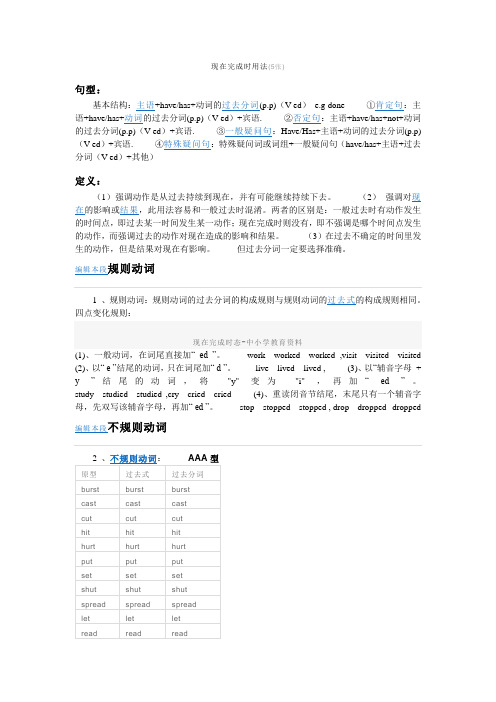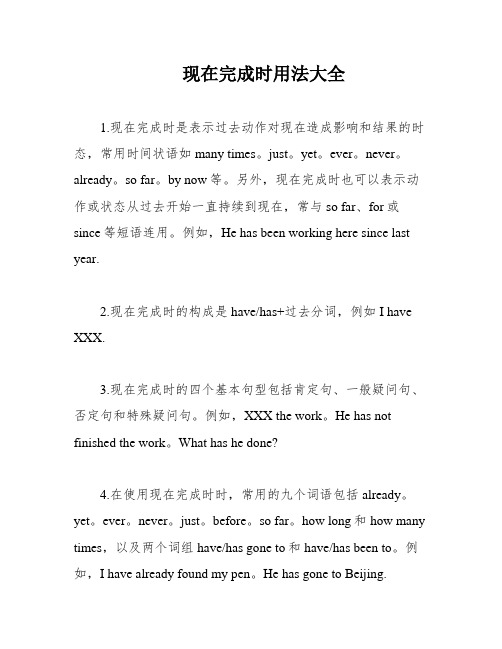用于现在完成时的句型
现在完成时常用句型

现在完成时常用句型1. “I have already eaten breakfast.” 早上我起来后,妈妈问我:“宝贝,吃早餐了吗?”我拍拍肚子说:“I have already eaten breakfast.”2. “You have juste back from school.” 我一进家门,爸爸就说:“You have juste back from school.”3. “We have played this game before.” 小伙伴们来找我玩游戏,其中一个说:“我们玩这个游戏吧。
”我回答:“We have played this game before.”4. “He has already done his homework.” 我去找小明玩,他妈妈说:“他在房间呢,He has already done his homework.”5. “She has watched this movie many times.” 我们讨论电影的时候,小红说:“这部电影超好看。
”我回应:“She has watched this movie many times.”6. “They have gone to the park.” 我问弟弟妹妹们去哪了,妈妈说:“They have gone to the park.”7. “I have known him for a long time.” 朋友好奇地问我和那个人认识多久了,我笑着说:“I have known him for a long time.”8. “You have read this book, haven't you?” 我拿着书问同桌:“You have read this book, haven't you?”9. “We have visited that place before.” 一家人商量去哪里玩,我突然想起说:“We have visited that place before.”10. “He has made a lot of mistakes.” 老师看着小明的作业说:“He has made a lot of mistakes.”。
现在完成时态的用法总结完整汇总

He has been a singer for eight years. He has been a singer since 1992. He has been a singer since he won the prize for music in 1992.
He has been a teacher for ten years. He has been a teacher since 1990. He has been a teacher since he left college in 1990. 1990-2000
left college
2000.7—2000.9 moved to Japan
⑤ Has he eaten that apple yet 他吃那个苹果了吗
注意:1 现在完成时的一般疑问句往往在句末加yet, 2 一般疑问句译成汉语时, 往往译成…..过吗 ,还有….吗 等. 3 其肯定回答用:Yes,….have has . 否定回答用:No,….haven‘t hasn’t .
6) My mother has been a doctor _f_o_r __ many years.
3.延续性动词与非延续性动词在现在完成时中的使用,
1 延续性动词:be,have,know,live,
work,study,learn,teach,speak,talk,draw,
wait,wear,walk,sleep等,这些动词可以和表示一段时间的状
语连用,例如:
现在完成时的用法详解英语

• Is your father in ?
•
No, heha__s_g__o_n__e__t_o___ to Shenzhen.
•
H__a__s___he everb_e_e__n__ there before ?
•
Yes, heh_a_s__b_e__e_n_____ there several times
ago.
A. Did…copy…did
B. Have…copied…have
C. Have…copied…did D. Did …copy…had
5. “Why _A_____ she _______ angry ?”
“Because he _____ at her just now .”
A. did…get…shouted B. has…got…shouted
A. Have…gone to B. Have…gone in
C. Have…been to D. Have …been in
3. My brother _C___college for over three years.
A. has gone to B. has been to C. has been at
但是不能和表示一段时间的状语连用。
短暂性动词变延续性动词:
• join --- be in / a
2) comeb-e-- in / at
• 3) borrow ---keep 4) buy -h-a-ve
5) arrive ---be
6) leave b--e- away (from)
7) begin --b- e on
• It has been colds_in__c_e__ two weeks ago.
现在完成时语法

现在完成时的基本句型:肯定式:主语+助动词have/has + 动词的过去分词.疑问式:助动词Have/Has + 主语+动词的过去分词?否定式:主语+ 助动词have/has + not+动词的过去分词.例句:1.Ihave cleaned myroom. 我已打扫了房间。
2. He hasn’tfinished his homework. 他还没完成作业。
3. Have you read thisnovel? 你看过这本小说吗?Yes,I have. 是的,看过了。
No, I haven’t. 不,没看过。
4.We have studied English for twoyears.我们已经学了两年英语了。
5.They haven’tseen each other since1998. ﻫ自从1998年他们就没再见过面。
现在完成时的主要用法1.表示过去发生的某一动作对现在造成的影响或结果。
--It’ssodark.--Someone has turnedoff the light.(有人刚把灯关了,对现在造成的结果是:现在很黑)-- Areyou free?--I havefinished myhomework. Iam free(我已经完成了家庭作业,对现在造成的结果是很有空)2.表示过去已经开始, 持续到现在的动作或状态,可以和表示从过去某一时刻延续到现在的一段时间的状语连用.表示持续动作或状态的词应是延续性动词.常与since+ 过去的时间点,since+谓语是一般过去时的从句;for+ 一段时间,sofar 等时间状语连用。
如:I have learnt English for more than tenyears.我已经学了10多年的英语。
(从10年前开始,持续到现在还在学)She has swum since half anhourago.我已经游泳了半个小时(半个小时前已经开始游泳,到现在还在游)3.表示人曾有过或到目前为止从未有过的经历.I haveeverbeentothe Summer Palace?(我曾去过颐和园)I have never hada car.(我从未有过汽车。
现在完成时用法

现在完成时用法(5张)句型:(V-ed)e.g done语(p.p)(V-ed)+宾语. +have/has+not+动词的过去分词(p.p)(V-ed)+宾语. Have/Has+主语+动词的过去分词(p.p)(V-ed)+宾语. +一般疑问句(have/has+主语+过去分词(V-ed)+其他)定义:(1)强调动作是从过去持续到现在,并有可能继续持续下去。
(2)的时间点,即过去某一时间发生某一动作;现在完成时则没有,即不强调是哪个时间点发生的动作,而强调过去的动作对现在造成的影响和结果。
(3)在过去不确定的时间里发生的动作,但是结果对现在有影响。
但过去分词一定要选择准确。
1四点变化规则:现在完成时态-中小学教育资料(1)、一般动词,在词尾直接加“ ed ”。
work---worked---worked ,visit---visited---visited(2)、以“ e ”结尾的动词,只在词尾加“ d ”。
live---lived---lived , (3)、以“辅音字母+ y ”结尾的动词,将"y" 变为"i" ,再加“ ed ”。
study---studied---studied ,cry---cried---cried (4)、重读闭音节结尾,末尾只有一个辅音字母,先双写该辅音字母,再加“ ed ”。
stop---stopped---stopped , drop---dropped--dropped(read原形发音为/ri:d/,过去式和过去分词发音为/red/) ABB型①for+时段为…时间②since+过去一个时间点(译为:自从……以来)③since+时段+ago ④since+从句(过去时)●⑤It is+时段+since+从句(过去时)(buy,die,join,lose……)不能直接与for since 连用。
要改变动词come/arrive/reach/get to-----be in go out----be out finish----be over open----be open die----be dead Buy---have Fall ill---be ill Come back---be back Put on ---be on/wear Worry---be worried Catch a cold---have a cold ……………… ★1.have代替buy My brother has had(不能用has bought) this bike for almost four years. ★2、用keep或have 代替borrow I have kept(不能用have borrowed) the book for quite a few days. ★3、用be替代become How long has your sister been a teacher? ★4、用have a cold代替catch a cold Tom has had a cold since the day before yesterday. ★5、用wear代替puton b)用1、be+married代marry 2、be+ill代fall (get) ill 3、be+dead代die 4、be+asleep代fall (get) asleep 5、be+awake代wake/wake up 6、be+gone 代lose,die,sell,leave 7、be+open代open 8、be closed代close/shut 9、be+missing(gone,lost)代lose c)用“be+副词”代终止性动词1“be+on”代start,begin 2“be+up”代get up 3“be+back(to)”代return to,come back to,go back to 4“be here (there)”代come(arrive,reach,get) here或go (arrive,reach,get) there等等d)用“be+介词短语”代终止性动词 1.“be in/at +地点”代替go to /come to 2.用be in the army 代替jointhe army 3.“be in/at +地点”代替move to常用瞬间动词变延续性动词表:1. have arrived at/in sw. got to/reached sw. come/gone/moved to sw. have been in sw./at…相应的介词2. have come/gone back/returned have been back 3. have come/gone out have been out4. have become have been5. have closed / opened have been closed/opened6. have got up have been up;7. have died have been dead;8. have left sw. have been away from sw.9. have fallen asleep/got to sleep have been asleep;10. have finished/ended/completed have been over;11. have married have been married;12. have started/begun to do sth. have done sth. ;13. have begun have been on14. have borrowed/bought have kept/had 15. have lost haven’t had16. have put on have worn 17. have caught /get a cold have had a cold;18. have got to know have known19. have/has gone to have been in20. have joined/have taken part in the league/the Party/the armyhave been a member of/ have been in/have been the Party’s member/the league member/the soldier…1.现在完成时不能单独与准确时间连用,(如表示过去的时间状语)如yesterday(morning、afternoon),last(morning、afternoon)等,除非与for,since连用.2.现在完成时往往同表示不确定的过去时间状语连用,如already(肯定), yet(否定,疑问), just, before, recently,still, lately,never等: He has already obtained a scholarship. I haven't seen much of him recently (lately). We have seen that film before. Have they found the missing child yet ?3. 现在完成时常常与表示频度的时间状语连用,如often, sometimes, ever, never, twice, on several occasion等: Have you ever been to Beijing I have never heard Bunny say anything against her. I have used this pen only three times. It is still good. George has met that gentleman on several occasions.4. 现在完成时还往往可以同包括现在时间在内的时间状语连用,如now, up to these few days/weeks/months/years, this morning/week/month/year, just, today, up to present, so far等: Peter has written six papers so far. Man has now learned to release energy from the nucleus of the atom. There has been too much rain in San Francisco this year. The friendly relations and cooperation between our two countries have been enhanced in the past few years. Up to the present everything has been successful.5. 现在完成时还可以用来表示过去的一个时间到现在这段时间内重复发生的动作.We have had four texts this semester. 6.现在完成时的"完成用法"现在完成时的"完成用法"指的是动作发生在过去某一时刻并已结束,但该动作对现在产生了影响,与现在情况具有因果关系。
现在完成时用法大全

现在完成时用法大全1.现在完成时是表示过去动作对现在造成影响和结果的时态,常用时间状语如many times。
just。
yet。
ever。
never。
already。
so far。
by now等。
另外,现在完成时也可以表示动作或状态从过去开始一直持续到现在,常与so far、for或since等短语连用。
例如,He has been working here since last year.2.现在完成时的构成是have/has+过去分词,例如I have XXX.3.现在完成时的四个基本句型包括肯定句、一般疑问句、否定句和特殊疑问句。
例如,XXX the work。
He has not finished the work。
What has he done?4.在使用现在完成时时,常用的九个词语包括already。
yet。
ever。
never。
just。
before。
so far。
how long和how many times,以及两个词组have/has gone to和have/has been to。
例如,I have already found my pen。
He has gone to Beijing.Jim has been living in this city for two months。
Lucy has been living in Beijing since three years ago。
He has been in China since he arrived here。
If there is no time adverb in the sentence。
the present perfect tense is often used to convey the meaning of "already" in Chinese。
For example。
"Have you lost your library book?" can be translated as "你已经弄丢了从图书馆借的那本书吗?"The present perfect tense is also commonly used in the following sentence patterns: "They have planted many trees in the last few years," "This is the best book I have ever read," and "It is the first time I have played computer games."In the present perfect tense。
现在完成时的三种句型

现在完成时的三种句型
现在完成时是英语中比较重要的一个时态,它表示动作发生在过去某个时间,但与现在有关系。
在使用现在完成时时,需要注意以下三种句型:
## 1. 主语+ have/has + 过去分词+ 其他成分
这是现在完成时最基本的使用方式,通常用于表示已经完成的动作或状态。
例如:
- I have finished my homework.(我已经写完作业了。
)
- She has lived in New York for five years.(她已经在纽约住了五年了。
)## 2. 主语+ have/has + been + 现在分词+ 其他成分
这种句型强调的是动作或状态的持续性。
例如:
- He has been studying English for five years.(他已经学英语学了五年了。
)
- They have been waiting for the bus for half an hour.(他们已经等了半个小时的公交车了。
)
## 3. 主语+ have/has + 过去分词+ since/for + 时间
这种句型用于表示一个动作或状态从过去某个时间开始一直持续到现在。
例如:
- I have known him since we were in high school.(我和他自从高中开始就认识了。
)
- They have been in love for three years.(他们恋爱已经三年了。
)
以上就是现在完成时的三种句型,需要根据具体语境进行选择使用。
希望这篇文章对你有所帮助!。
现在完成时

现在完成时(1)常考用法:①表示过去发生或已经完成的动作,并对现在造成一定影响或结果。
already(已经),never(从不),ever(曾经),yet(还), just(刚刚),before(在…之前).till now(迄今), two/three times(两/三次),since then(从那时以来), for(达/计),so far(到目前为止), in the past/last….years(在过去几年),for+一段时间for 2days/1month/3years/an hour等,since+时间点(1)already(已经)通常用于肯定句中△already①可放在助动词与过去分词之间②也可放在句末! I've read this book already. I've already read this book.我已经读过这本书了(2)yet在疑问句中意为"已经”,在否定句中意为"还”Nina hasn't found her bag yet.△yet常放在句末!妮娜还没有找到她的包。
(3)ever(曾经)常用于疑问句或否定句中ever放在助动词与过去分词之间!Have you ever been to Beijing?你曾去过北京吗?(4)never(从来没有)表示否定,常与before连用△before要放在句尾!△never多放在助动词与过去分词之间!I have never been to Beijing before. 我以前从来没有去过北京。
持续性→表示过去已经开始,持续到现在的动作或状态,并有可能继续进行下去。
☆与段时间连用谓语动词必须是延续性动词注意: ☆常与for+一段时间since+过去的点时间或从句(从句用一般过去时)so far(到目前为止)等时间状语连用☆对for和since引导的时间状语提问要用how long(1) I have lived here since 2020. △延续性动词自从2020年以来我就住在这里。
- 1、下载文档前请自行甄别文档内容的完整性,平台不提供额外的编辑、内容补充、找答案等附加服务。
- 2、"仅部分预览"的文档,不可在线预览部分如存在完整性等问题,可反馈申请退款(可完整预览的文档不适用该条件!)。
- 3、如文档侵犯您的权益,请联系客服反馈,我们会尽快为您处理(人工客服工作时间:9:00-18:30)。
用于现在完成时的句型
(最新版)
编制人:__________________
审核人:__________________
审批人:__________________
编制学校:__________________
编制时间:____年____月____日
序言
下载提示:英语语法是针对英语语言进行研究后,系统地总结归纳出来的一系列语言规则。
英语语法的精髓在于掌握语言的使用。
而且,英语语法是一套完整的语言知识体系。
如果你想英语能够更进一步,英语语法就是其中的主要一环。
Download tips: English grammar is a series of language rules that are systematically summarized after studying the English language. The essence of English grammar lies in mastering the use of language. Moreover, English grammar is a complete language knowledge system. If you want English to go further, English grammar is the main link.
正文内容
1)It is the first / second time…. that…结构中的从句部分,用现在完成时。
It is the first time that I have visited the city.
It was the third time that the boy had been late.
2)This is the… that…结构,that 从句要用现在完成时.
This is the best film that I've (ever) seen.
这是我看过的最好的电影。
This is the first time (that) I've heard him sing. 这是我第一次听他唱歌。
典型例题
(1) ---Do you know our town at all?
---No, this is the first time I ___ here.
A. was
B. have been
C. came
D. am coming
答案 B. This is the first time 后面所加从句应为现在完成时,故选B。
(2) ---Have you ____ been to our town before?
---No, it's the first time I ___ here.
A. even, come
B. even, have come
C. ever, come
D. ever, have come
答案D. ever意为曾经或无论何时,反意词为never,此两
词常用于完成时。
This is the largest fish I have ever seen. It is / was the first time +that-clause 的句型中,从句要用完成时。
注意:非延续性动词的否定形式可以与表示延续时间的状语连用。
即动作不发生的状态是可以持续的。
(错)I have received his letter for a month.
(对)I haven't received his letter for almost a month.。
